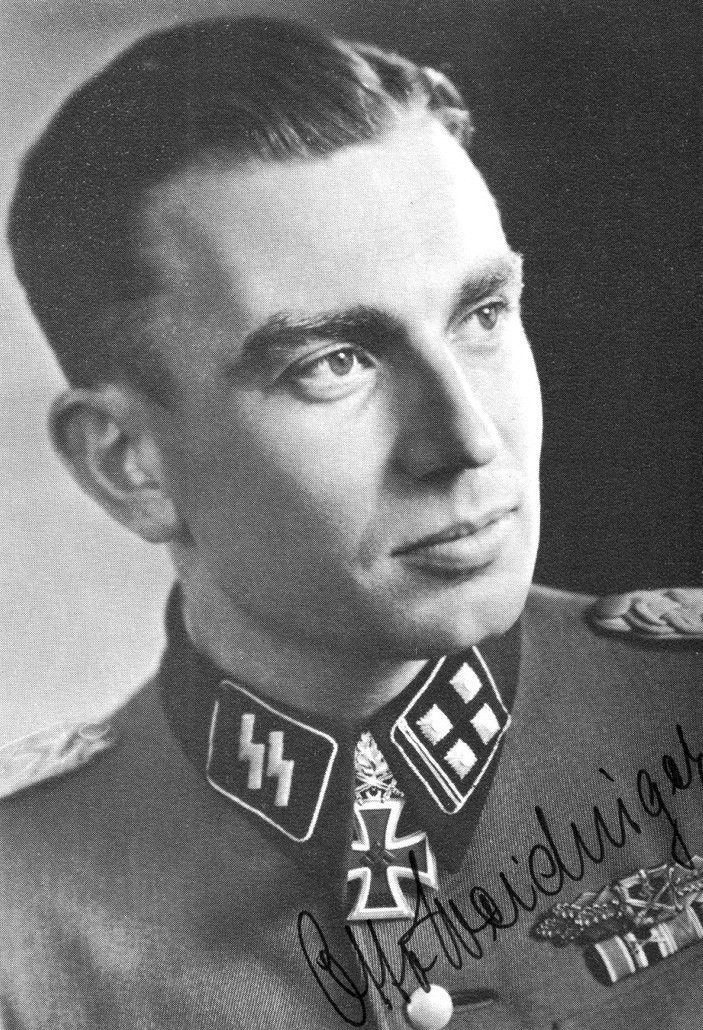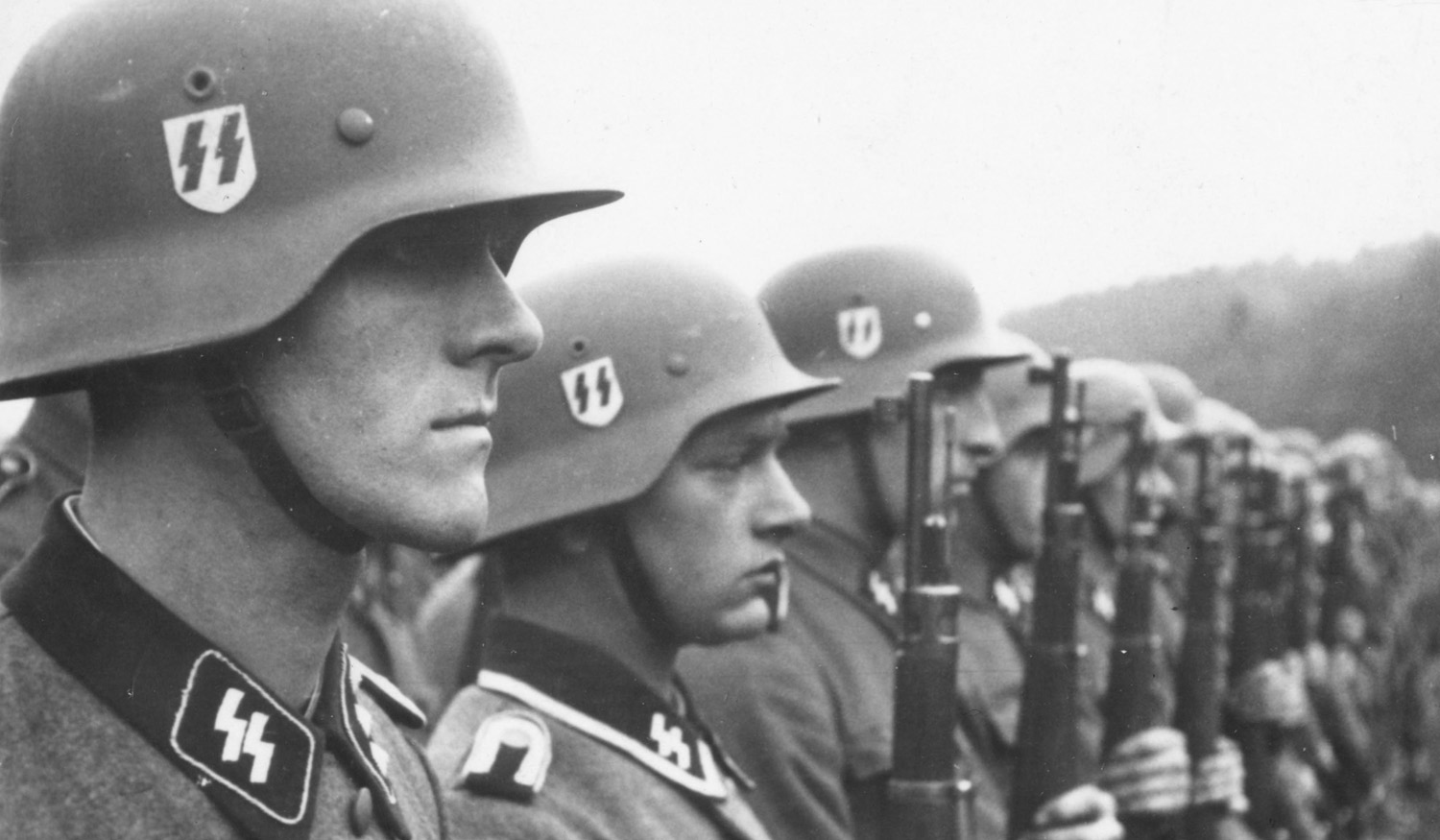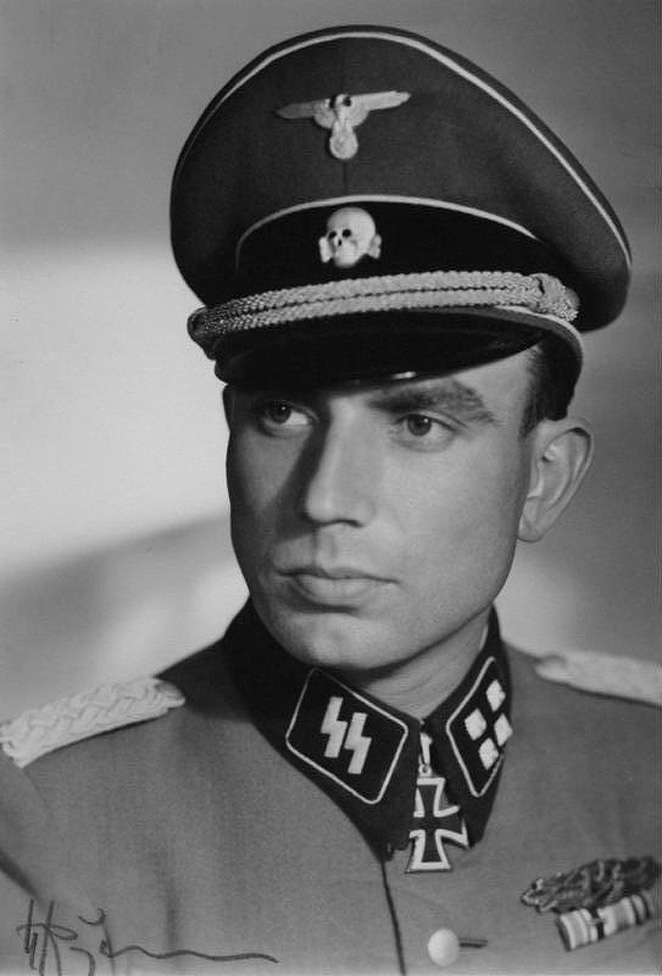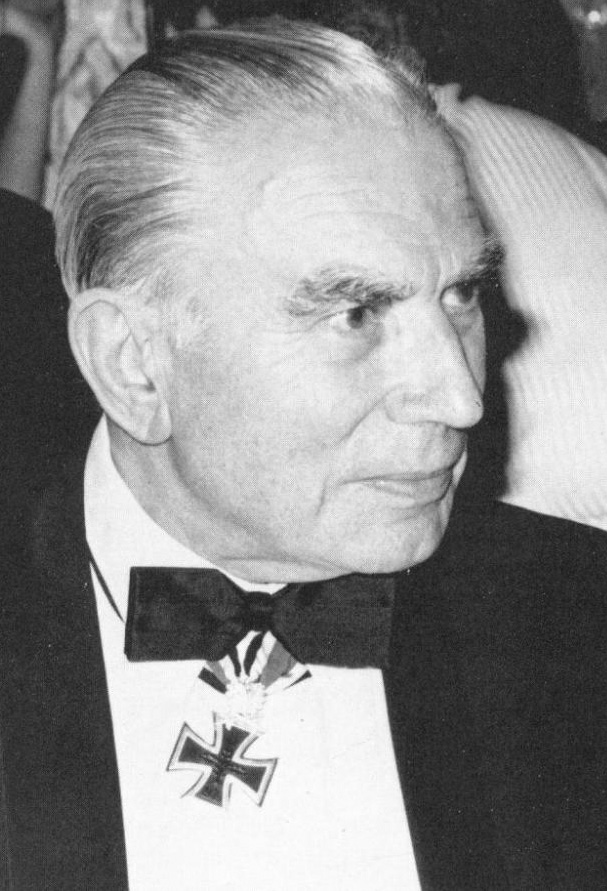

Interview with the extraordinary Otto Weidinger, regimental commander of the SS Panzergrenadier Regiment 4 'Der Führer', a member of the 2nd SS Panzer Division 'Das Reich', and winner of the Knight's Cross with Oak Leaves and Swords, Nuremberg, 1984.

Thank you for meeting with me, I would like to start by asking what brought
you to join the SS?
Otto: It is not very complicated to say, Hitler and the NSDAP had been elected
to power, almost all Germans saw this as a good thing and I wanted to do my
part to help my people. I heard the Reichsführer-SS Himmler give a talk, which
was more a recruiting speech, and I was stirred to action. He spoke of a spirit
that was to emerge from the SS, a spirit to instill the resolve and faith of our
ancestors. He spoke regarding how this new National Socialist spirit was the
will of our creator, and embodied his laws of honor, peace, humility, and
charity.
I was convinced this was my fate and many friends had already
joined and wanted me to follow. I accepted this and went through the
application process and was accepted in 1934. For me the SS stood for the
best in Germany, and the point of the spear of National
Socialism. I was very proud to be awarded the dagger of the SS, and to wear
it proudly on my black uniform. The SS stood above our enemies, even in
defeat. The SS remained true even when all others become disloyal. That was
our motto.
You mentioned you were posted to Dachau concentration camp, what was it
like?
Otto: I never speak of this as it can bring great tribulation to anyone affiliated,
but I will tell you. Yes, I was posted as a guard once I completed training, but
this was a short stint. The complex at Dachau was not just a prison camp; it
was an SS training barracks, hospital, and workshops. [Theodor] Eicke commanded this
complex, and we were under his command. He was appointed due to the first
commander being relieved. It was rumored he allowed the police to rough
up certain political prisoners to settle old scores.
This is why the SS was brought in as camp guards, to maintain order
and fairness. I want you to know the camp was created to hold violent
prisoners who railed against Hitler and National Socialism and encouraged
acts of murder and terrorism. To the police, they were settling old scores with people they could not touch during the Weimar era. Many forget that the Reds killed many people in Germany from 1918-1933.
It is testament to Himmler that he quickly stopped this and
prosecuted the guilty. They wanted to make peace with former enemies and
win the hearts of all Germans. Even though some may have deserved their
fate, our orders were to protect all prisoners from abuse, and to see that they
were treated fairly in every interaction. We could not touch them, verbally
abuse them, or take anything from them. Any punishment had to be approved
by Eicke, and he rarely allowed any. The goal was, along with Hitler's
amnesty, that most would go on to be productive citizens in the new Reich.
What did the average German think about the camps?
Otto: I know that the average person was tired of all the in-fighting and
political madness that was Germany after the first war. Nothing was being
done for the people and it became clear that a strong party had to take charge,
so the people voted for Hitler. They saw how his opponents were cruel,
selfish, liars, and criminals. Therefore, it was no surprise that those who did
not flee to foreign lands had a reckoning. The camp mostly held the leaders
of the KPD and other branches of the Moscow faction.
The camp was no secret, people could visit the prisoners, and mail
was free to send. Prisoners who were low risk were allowed to work in the
workshops and SS barracks with no supervision. The newspapers did articles
on prisoners who were being released, of which there were many. These
camps were prisons, and just like in any other nation, they held people who
refused to adhere to the laws of the land. Do not fall victim to the propaganda
of today, I saw the plays, dinners, and parties the prisoners put on. I saw with
my own eyes in 1943, a truck full of instruments going into the camp for a
concert.
You fought on the Eastern Front, what did you think of the Russian soldier?
Otto: He was resourceful, cunning, and mostly uneducated, just what the
Communists like. This could also make them cruel and reckless. I fought
against them often and was amazed at their strength of numbers. The General
Staff underestimated them from the very beginning and sent us into a
lopsided struggle. I will say that from the beginning of Barbarossa they
fought hard, but committed many war crimes. I saw murdered German
soldiers who had been shot in the back of the head, and soldiers who showed
signs of torture.
This set the stage for reprisals against the guilty which the 'free press' condemns us for, ignoring the acts of terror that caused these reprisals
in the first place. In spite of the actions of a few, we treated the Russians very
well, and the proof of this is the vast numbers who joined to help us in the
fight against Communism. We raised whole armies and countless came west
to help in the factories, on their own will, I will add. I have many photos that
show how well we related to the Eastern peoples.
Certain powers have used the press to raise claims that we killed
millions of civilians, a roving killing machine, one wrote, which is not true,
and our photos prove this. We went out of our way many times to keep them
safe and out of harm's way. Prisoners were well cared for while under our
control and treated fairly. My medical staff spent valuable hours treating our
enemies when they could. There was no hatred of the Eastern peoples, which
the press speaks of today. We actually felt sorry for them more than anything.

[Above: The Knights of the Sun, whose sacrifice and truth still shine to us over 75 years later.]
Can I ask about the accusations that Das Reich killed French civilians during
the march to Normandy?
Otto: Yes, I must also write about this someday, the truth needs to be told.
Young man, they say we marched through the south of France and went out
of our way to kill any Frenchmen that made us angry, just for fun. It is like
living in a cruel fairy tale. The Waffen-SS was raised to be brave and fearless,
but also lawful and merciful. We have done none of these vast amounts of
actions that our enemies and their lackeys say we did. War crime stories are
very easy to invent, and no one questions them.
I know what happened in these hotbeds of Communists. I saw first�hand the illegal acts of the Maquis that culminated in the confrontation in the
towns. The Maquis made this situation much worse by acting more like
gangsters than anything else. The Allies bear a lot of guilt in this also; they
knew [international] laws made it illegal for civilians to fight, doing so put your life at risk.
They declared these civilians legal soldiers, but just because they said so did
not make it law. They were under the treaty Germany signed with France and
forbidden to take up arms. Doing so made one an illegal combatant, subject
to severe punishment.
German forces largely ignored the Maquis until June 1944, which
was a huge mistake. Once the landings happened, seized towns were used as
bases of operations, and the Allies flew in supplies and weapons for them to
use against us. We received orders to advance to Normandy, and at first, our
movement was easy, the French near our barracks came out to see us off,
giving us food and good wishes. Due to the amount of vehicles we had, some had to split off. Some French told us that a few towns had been taken over by
communist Maquis and to avoid certain areas.
The warnings were ignored, and some German units drove into these
areas and were ambushed. Radio distress calls went out and we detached a
few platoons to investigate, some coming under fire almost immediately. Our
leader could see a hornet's nest was stirring, but we also had to march to the
front as fast as possible. The armor kept going, and small battle units had to
halt to deal with the situation.
From the report of an escaped SS officer, the Maquis killed over 100
German soldiers in the most bestial way. Even the women had taken part in
this and were identified as Maquis terrorists. Justice had to be served on these
reckless killers. An assault was launched and Oradour was taken, everyone
was separated, with women and children going into a church and the men
grouped for investigation. Witnesses gave statements as to what happened to
the German soldiers and helped identify the killers. The guilty were ordered
shot, and searches of the homes turned up Allied weapons. The order was
given to burn the homes where illegal munitions were found.
Hidden illegal explosives and ammunition that were not found
started to cook off and caught homes close to the church on fire. We had no
way to fight these flames, although our men tried. I was told that as men
approached the church to let the women and children out, a small explosion
happened inside, and white-hot flames shot up to the bell tower. It had to be
phosphorus munitions that were hidden in the church. Other detained
children kept nearby were removed and taken to safety.
In Tulle, some of the guilty were not punished, as there were
conflicting stories and evidence that not everyone charged had taken part in
the orgy of death. We did hang those whom witnesses stated had taken part
in killing or abusing German soldiers. In Oradour the whole town seemed to
be helping the Maquis, communists from all over Europe had flocked here to
hide and wage a guerrilla war on German forces. It was claimed by the French
that German soldiers started the fire in the church, but this is not true. A story
has circulated, told by a French survivor, that one of the Maquis was hiding
in the church and tried to do something, setting off munitions. My mind tells
me that this is why there was a commotion. Someone was trying to gather
grenades and weapons, and some of the women tried to stop them, causing
something to accidentally go off, and sparking the fire. A later report told of
grenade fragments of British origin found in the church.
The ruins showed something very hot, hotter than fire, melted the
tower bell, it had to be illegal phosphorous munitions that the Allies gave
them. German soldiers were angry at what had been done to their comrades, it is true, but they never would have burned down a place of worship with women and children inside. I am certain this was caused by the actions of
someone hiding who decided to try to fight. Another explanation could be
that sparks from the fires happened to land on something causing the
explosion. The 'eyewitnesses' who say otherwise are simply telling a lie to
fit their politics.
We were all placed on trial in France after the war, surprisingly the
French handled this fairly, for the most part. They did not allow emotions to
dictate the trial, like is happening today. We were all found not guilty, as they
knew it was their own delusional fellow citizens and communists who caused
these actions, not German soldiers. Our reprisals were based on orders that
were fair and within the laws of war.

[Above: One of the brightest stars of the SS, Otto Weidinger, circa 1944.]
What about all the other claims that accuse Waffen-SS soldiers of terrible
crimes against the peoples of Europe? The tribunal labeled the entire SS as
a criminal organization due to the vast amount of killings that the SS
undertook.
Otto: It is a testament to the SS that after Oradour, a special court was
convened to investigate. The communist Maquis protested to the still in
power occupation government that a massacre took place. Even in the midst
of the battle that would decide the fate of Europe, men were placed before a
court of honor. This should tell you that there was no loose policy to target
and kill civilians. The entire Wehrmacht faced something not seen before, a
concerted effort of terror networks to fight behind the lines. Families of allies
were targeted, hospitals, families on vacation, soldiers on leave, and these
criminals even stooped so low as to kill nurses.
During and after the war, the Allies inflated and manufactured
numbers to detail the supposed crimes. They brought forth witnesses who had
an axe to grind with the occupation of their countries and they allowed them
to lie. The law that Germany agreed to follow during the war allowed for the
harsh treatment and execution of anyone who chose to fight as a terrorist. I
say this again, the Allies funded these groups and encouraged their actions,
which makes them guilty as well.
This type of war was happening in Italy, the Balkans, and France. We
had a good network of helpers and allies who understood these criminals
were mostly communists who wanted a world revolution that needed
National Socialism to be destroyed. They would use any means and all
options to make this happen, which allowed for much bloodshed and terror
attacks. Even after the war, they kept some of this up against the new
governments, until being imprisoned or executed.
The only way we could understand to fight this was to exact an
equal, if not greater, amount of reprisals against these criminals. If one
German was killed, then ten terrorists would have to pay. In this way, it would
make them think twice and it worked. We rarely had to resort to this as we
used negotiations primarily; we paid money for the release of our people and
used captured prisoners as tools for exchanges. We tried to be as humane as
we were allowed to be, not everyone we captured was a diehard enemy.
I speak of the west, but in the east, it was the same. The bands of
terrorists were mostly all communists, with many Jews helping them, which
accounted for the many Jews executed. We had more help in the east as well,
and at times, these allies could be quite cruel to the already cruel enemy. We
did what we had to do and followed orders that were well within the rules of
war. We were not ashamed of doing our duty, and avenging fallen comrades by executing bloodthirsty terrorists who rarely had any honor.
What impression do you have of American soldiers?
Otto: Unlike some of my comrades in the Wehrmacht, I have no desire to
speak well of former enemies. I have heard the many testimonies by my men
who were harshly treated. Many American soldiers gloat that they did not
take SS men prisoners. It may interest you that some of the best treatment was
by your black soldiers. Rarely did I hear of mistreatment by them, unless
ordered by a Jewish superior. Now with this being said, there are many good
Americans who are open-minded and not blinded by hate. After the war and my release from prison, many reached out to me to learn the truth.
While I cannot speak for all veterans of the Waffen-SS, I will say we
are angry and frustrated that our rebuttals are not allowed to be heard. Any
defense of our actions is met by protests and hate; there is no real objectivity
and balance. Hidden hands smear us and secretly pour their wealth into
growing these atrocity stories, all to drum up sympathy for themselves. Our
grandchildren are taught we were killers and sadistic humans who deserve
neither compassion nor mercy, and it gets worse each year.
I am afraid that after our passing there will be no one left to speak
our truth and challenge the stories the victors can tell. Their criminals will be
treated as heroes and our heroes treated as criminals. We will be judged even
harsher, while the crimes of the victors go unspoken and unpunished. The
people we loved and the nation we died for will have turned its back on us,
allowing us to be desecrated. My faith will be that our creator will have the
final judgment, and most will be surprised at the verdict.

[Above: Otto Weidinger, early 1980s, many years after the shooting stopped, although the war is far from over.]
Back to Interviews







